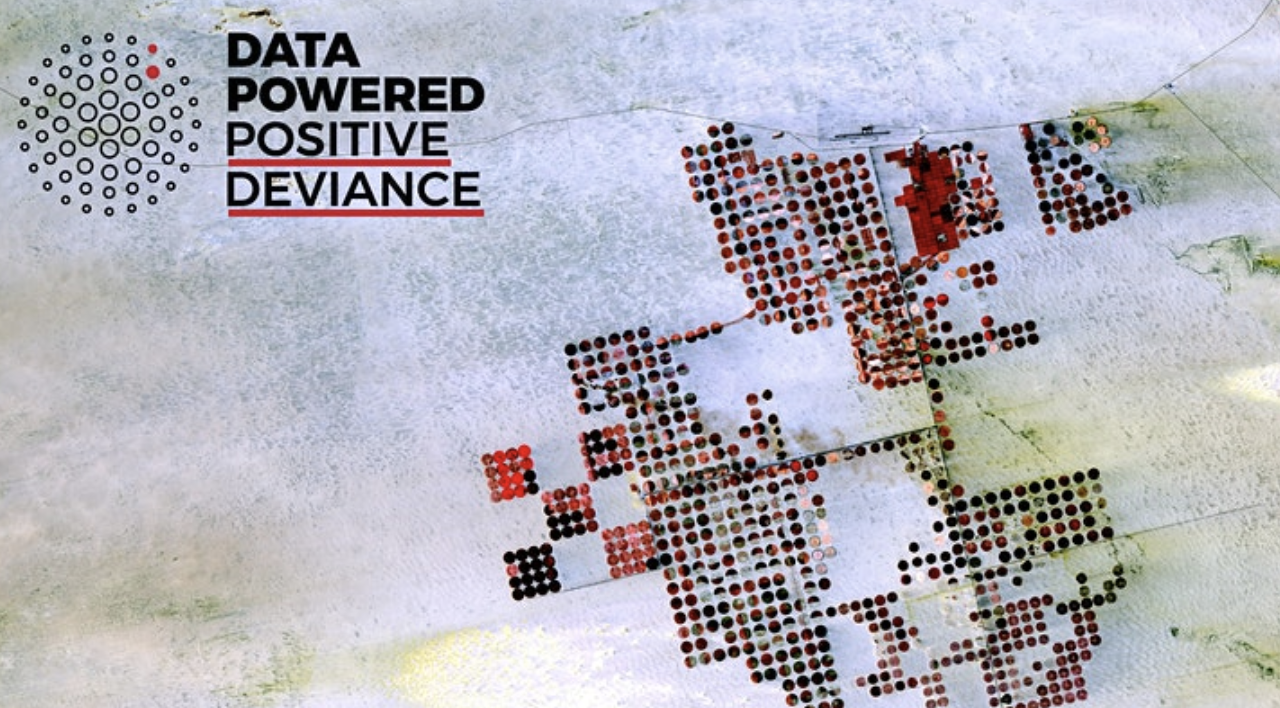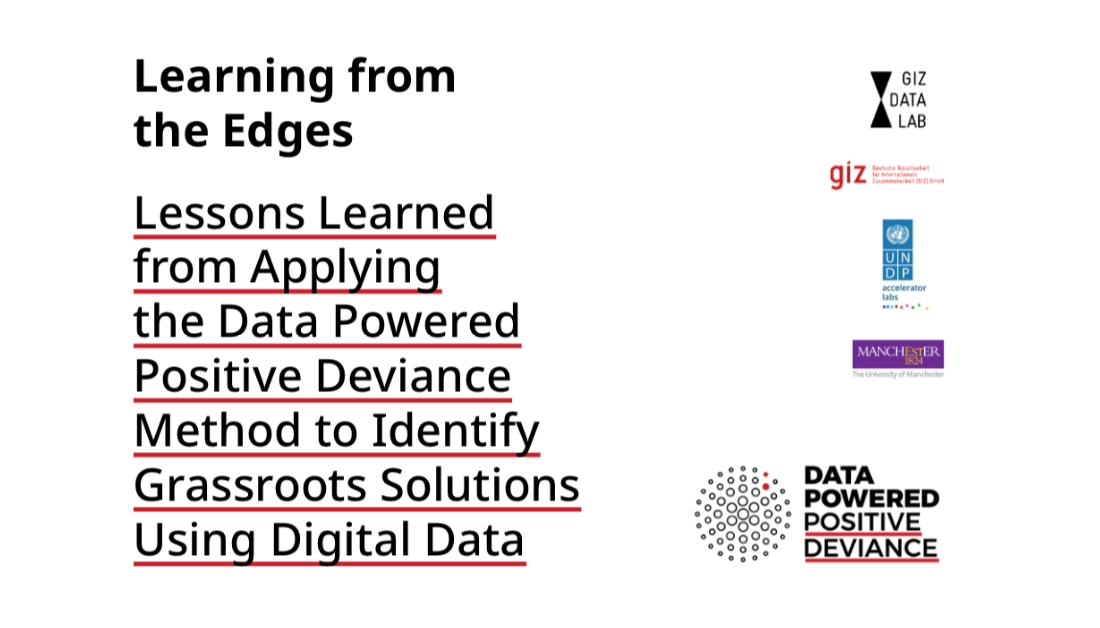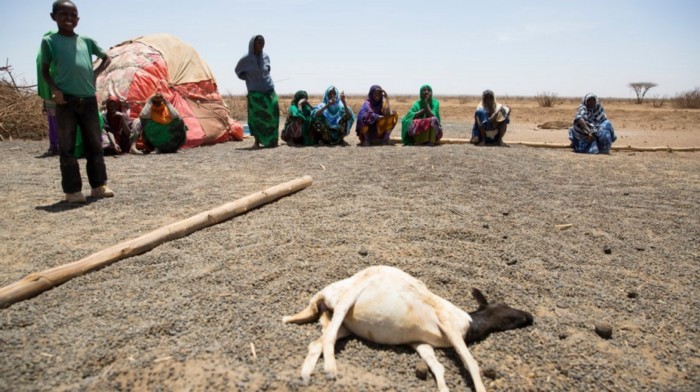Data Powered Positive Deviance
Key Highlights

Our Data Powered Positive Deviance Handbook is out now!
On November 25, 2021, the Data Powered Positive Deviance (DPPD) initiative launched the DPPD handbook. It provides step-by-step guide to applying the DPPD method — a mixed methods approach that relies on a combination of traditional and non-traditional data for identifying grassroots solutions to complex development problems.
Read the DPPD handbook

Our Data Powered Positive Deviance Report is out now!
This report "Learning from the Edges: Lessons Learned from Applying the Data Powered Positive Deviance Method to Identify Grassroots Solutions Using Digital Data" presents six learnings on how to use non-traditional data sources to support a Positive Deviance approach to development practice. They are derived from four pilot projects, jointly conducted by the UNDP Accelerator Labs Network, the GIZ Data Lab, and the University of Manchester, that have tested the Data Powered Positive Deviance (DPPD) method in Ecuador, Mexico, Niger and Somalia. The report is written for development practitioners, data analysts, domain experts, and more generally anyone interested in using new data sources and technologies to uncover successful local solutions to development challenges. Download it today.

Development Engineering: Data Powered Positive Deviance
This paper presents such guidance through a data-powered method that combines both traditional and non-traditional data to identify and understand positive deviance in new ways and domains. This method has been developed iteratively through six development projects covering five different domains – sustainable cattle ranching, agricultural productivity, rangeland management, research performance, crime control – with global and local development partners in six countries. The projects combine different types of non-traditional data with official statistics, administrative data and interviews.
Download this paper.

The Data Powered Positive Deviance Handbook Launch Event
Thursday, 25 Nov 2021, 8:00 AM – 9:30 AM ET / 2 - 3.30pm CET.
The Data Powered Positive Deviance (DPPD) Initiative launched the Data Powered Positive Deviance Handbook on Nov. 25, 2021. This even introduced the DPPD Handbook and presented the five stages of the DPPD method with practical examples, drawn from four pilot projects we are finalizing in Ecuador, Mexico, Niger, and Somalia. This event also celebrated of the achievements of the first teams who applied the method.
Missed this event? Watch the replay today here.

Our Session at the United Nations Data Forum 2021
Oct 6, 2021, 8:30 AM-9:30 AM Central European Time
UNDP Accelerator Labs Network, the GIZ Data Lab, the University of Manchester Centre for Digital Development, and UN Global Pulse Lab Jakarta, will join the UN Data Forum 2021 to showcase their work the data powered positive deviance. The team will showcase how we work on bridging the gap between big data and explorative field research in Ecuador, Mexico, Niger, and Somaliland. Find out more: Session link.
About the initiative
The Data Powered Positive Deviance Initiative (DPPD), a joint alliance between the UNDP Accelerator Labs Network, the GIZ Data Lab, the University of Manchester Centre for Digital development, and UN Global Pulse Lab Jakarta, is rooted in the belief that knowledge on how to tackle complex sustainable development challenges is best informed and spread by people who face those challenges and find their own solutions. The Initiative is testing a new Data Powered Positive Deviance method for sustainable development through a series of pilots, which combine traditional and non-traditional data sources to identify positive deviants in new and enhanced ways.
Positive Deviance assumes that in every community, there are individuals or groups who develop uncommon practices to cope with the challenges they face, which sets them apart from peers who have access to the same resources. Identifying these positive deviants and empowering them to share their practices with the rest of their communities is at the heart of Positive Deviance work and has already proven successful in several countries and sectors.
The DPPD method is novel in that it uses readily available data—satellite imagery, biophysical data, or any other source of digitally recorded data—to narrow down the search for possible positive deviants across large geographic areas and timeframes before going to meet them in their environments.
Four initiatives: Ecuador, Mexico, Niger, Somalia

Somalia/Somaliland: Supporting Pastoralist Communities Amidst Environmental Challenges
The UNDP Somalia Accelerator Lab together with its local GIZ partners, are using satellite imagery and climate data to identify positively deviant pastoralist communities that are able to sustain their way of life, despite enduring the effects of climate change.
The Data Powered Positive Deviance, Under the Hood Series:
Somali Rangelands Defying the Odds
WATCH THE SESSION

Ecuador: Mitigating Deforestation through Sustainable Cattle Raising
The UNDP Ecuador Accelerator Lab together with its local GIZ partners, are using land cover/ land use and official cattle vaccination data to identify positively deviant cattle farmers who operate in zones of expansion of the agricultural frontier without further contributing to deforestation.
The Data Powered Positive Deviance, Under the Hood Series:
Deforestation, Cows and Data:
WATCH THE SESSION

Mexico: Addressing Violence Against Women in Public Spaces
The UNDP Mexico Accelerator Lab together with its local GIZ partners are using crime reports and urban data to identify positively deviant public spaces where women are safest in Mexico City. Learn the progress they've made, key insights and process in identifying safe(r) public spaces for women in Mexico City.
Data Powered Positive Deviance, Under the Hood Series:
Addressing Violence Against Women in Public Spaces in Mexico:
WATCH THE SESSION

Niger: Ensuring Food Security Through Sustainable Agriculture
The UNDP Niger Accelerator Lab and its local GIZ partners are using remote sensing and biophysical data to identify positively deviant cereal farming communities that produce significantly better yields of rain-fed sorghum and pearl millet, while dealing with the negative effects of droughts and conflict.
Data Powered Positive Deviance, Under the Hood Series:
Ensuring Food Security Through Sustainable Agriculture in Niger:
WATCH THE SESSION

 Locations
Locations